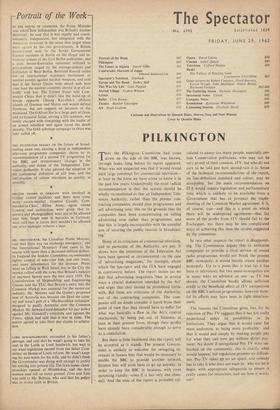—Portrait of the Week— IN THE HOUSE OF COMMONS, the
Prime Minister was asked"how independent was Britain's nuclear deterrent : he said that it was legally and consti- tutionally independent, but integrated with the Arneri,:an deterrent in the sense that target plans were agreed by the two governments. A British Government note to the Soviet Government blamed incidents in Berlin on the illegal and in- humane actions of the East Berlin authorities, and a joint Soviet-Rumanian statement referred to provocations staged by the revenge-seekers and militarists of West Berlin. Bertrand Russell called for an international resistance movement of neutral powers against nuclear weapons, and said that if the Soviet Union went ahead with tests over land the neutral countries should stop all air traffic with her. The United States told Com- munist China that it didn't like the build-tip of troops opposite Chiang Kai-shek's offshore islands of Quemoy and Matsu and would defend Formosa, but not support an invasion of the mainland. The OAS set fire to a large part of Oran, and ex-General Salan, serving a life sentence, was newly charged with conspiring with the leader of an armed rebellion and again faced the death penalty. The OAS sabotage campaign in Oran was later called off.
*
[HE PILKINGTON REPORT Oil the future of broad- casting came out, causing a drop in independent television programme companies' shares by its recommendation of a second TV programme for the BBC, and revolutionary 'changes' in the authority and duties of the Independent Tele- vision Authority. It also advised the adoption of he continental definition of 625 lines and the iiiiroduction of colour television as quickly as inci I INN TROOPS IN GERMANY were involved in thither violent incidents and there were some more courts-martial. General Cassels, Com- mander-in-Chief, Rhine Army, again visited London and instructions were given that re- porters and photographers were not to be allowed near him. Single men in barracks in Germany were told that in future they wouldn't be allowed
• out after midnight without a pass.
MR. DIEFLNBAKER, the Canadian Prime Minister, said that there was an exchange emergency,' and the international Monetary Fund came to the rescue with more than a thousand million dollars. In England the Jenkins Committee recommended tighter control of take-over bids and unit trusts, and more information for the investor. Prices went on falling in Wall Street, but in the City the market rallied with the news that Britain's balance of payment figure's were the best since 1959. The Confederation of Shipbuilding and Engineering Unions told the TUC that Britain's entry into the Common Market was essential for the motor-car industry. Mr. Menzies said the Queen's proposed tour of Australia was becaUse she liked the coun- try and wasn't part of a 'Machiavellian technique' designed to pacify Australia over the Common Market. Mr. Selwyn Lloyd defended his pay policy against Mr. Gaitskell's 'criticisms and against the Times, which had said that it was in ruins. The nurses agreed to take their pay claims to arbitra- tion.
LORD HINCHINGBROOKE succeeded to his father's peerage, and said that he wasn't going to take his seat in the Lords as Lord Sandwich, but wait to see what legislation ensued from the Select Com- mittee on House of Lords reform. He wasn't keep- ing his seat warm for his wife, and he didn't think the Government was doing well enough to justify his retiring into private life. The lawn tennis cham- pionships opened at Wimbledon, and the first woman seed fell on stony ground. Time and Tide was sold to Mr. Brittain, who said that his policy was to revive faith in Britain.
































 Previous page
Previous page